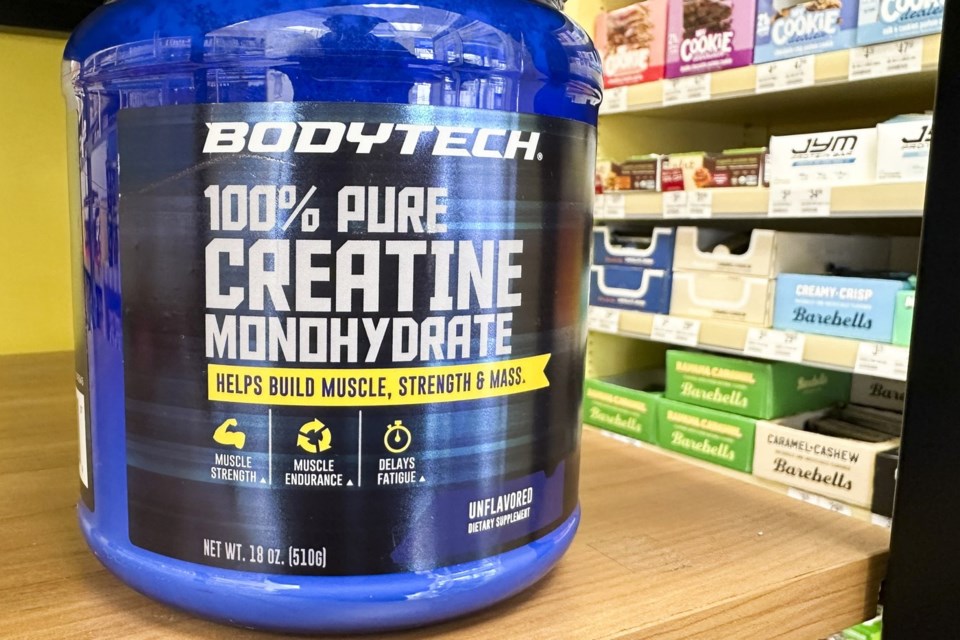TORONTO — Researchers say pediatricians, family doctors and parents need to learn more about what kind of performance-enhancing substances kids are using when they work out or play sports.
Seventeen per cent of more than 800 Canadian pediatric specialists surveyed said they saw adolescents who needed medical attention due to performance-enhancing products, including both legal and illegal substances, during the previous year.
The majority of cases were boys and more than half of them were between 13 and 15 years old.
Almost a third of the patients were even younger — between 10 and 12 years old.
Legal performance-enhancing substances include dietary supplements such as whey protein, creatine, amino acids and "pre-workout" drinks or powders which are readily available in grocery stores, pharmacies and online.
Pre-workout drinks or powders are a mixture that often include amino acids, creatine and caffeine, which are "meant to kind of help catalyze the workout, give you lots of energy," said Kyle Ganson, an assistant professor of social work at the University of Toronto and co-lead researcher on the survey.
"The problem with them is they typically have lots of different ingredients. They also have really high caffeine counts typically," said Ganson.
"A lot of people ... say they don't like them because they actually make them feel really jittery or give them heart palpitations. And so it can be quite problematic."
Illegal performance-enhancing drugs include anabolic-androgenic steroids, which are synthetic testosterone, and selective androgen receptor modulators (SARMs), which mimic the effects of testosterone.
Ganson, who has conducted previous research on the issue, said the use of both legal and illegal performance-enhancing substances have been on the rise among adolescents over the last several years.
The survey included responses from 857 pediatric specialists, who reported seeing a total of 55 patients affected by performance-enhancing supplements or drugs.
Of those cases, 40 per cent involved the use of whey protein powders or protein shakes, while 29 per cent involved the use of pre-workout drinks or powders.
Almost one-quarter of the cases involved illegal drugs such as anabolic-androgenic steroids.
The pediatricians surveyed reported kidney problems in nearly a third of the cases and gastrointestinal symptoms in about a quarter of the patients.
The survey results did not specify other adverse effects, but noted that the majority of the 55 patients affected recovered fully. Twenty patients either had ongoing health issues or their outcome was not known.
In an emailed statement on Wednesday, Health Canada said it authorizes "certain workout supplements, including those containing protein, creatine and amino acids, as natural health products for use by adults 18 years of age and over."
"The age limit is to mitigate safety risks for children, which could include kidney damage, digestive issues, and weight gain," it said.
Although it requires that information to be placed on the product labels, it does not require age verification at the point of sale, Health Canada said.
The state of New York started banning the sale of muscle-building and dietary supplements to minors in April 2024, the Associated Press reported.
More than half of the Canadian pediatric specialists surveyed said they never screen for performance-enhancing substances in their routine practice and more than a quarter said they have no knowledge about the substances.
Ganson said it's important for both primary health-care providers and parents to learn about the different substances adolescents are using to achieve a muscular appearance or improve their athletic performance.
Social media influencers and friends play a big role in encouraging young people to use the substances, but many also do a lot of their own research online, he said.
"Pediatricians (and) health-care providers at large just need to have that same level of knowledge and be able to talk about these different supplements and really know about them — what the purposes of them are, how they're marketed ... to be able to kind of get on the same level as these young people," he said.
Ganson said while it might not be possible to stop all adolescents from using dietary supplements, health-care providers and parents need to ensure they're using them as safely as possible — including not taking too much — and getting the products from reputable sources.
But if an adolescent is considering using steroids or other drugs, "then of course you want to sort of intervene in a more immediate way with the right (health-care) providers to prevent any sort of potentially serious effect," he said.
The survey was conducted as part of the Canadian Paediatric Surveillance Program of the Canadian Paediatric Society.
This report by The Canadian Press was first published Aug. 27, 2025.
Canadian Press health coverage receives support through a partnership with the Canadian Medical Association. CP is solely responsible for this content.
Nicole Ireland, The Canadian Press



